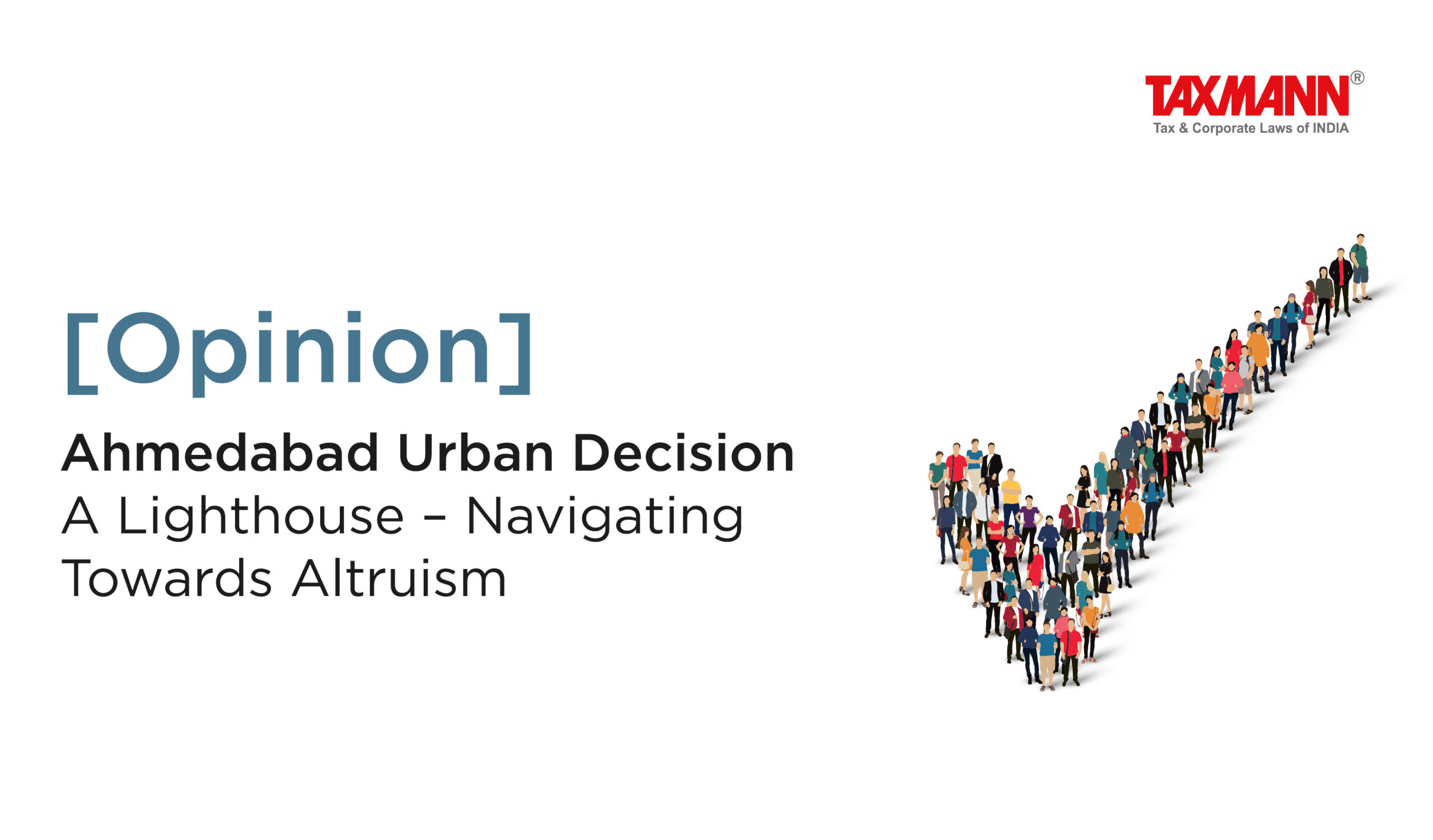[Opinion] Ahmedabad Urban Decision | A Lighthouse – Navigating Towards Altruism
- Blog|News|Income Tax|
- 3 Min Read
- By Taxmann
- |
- Last Updated on 4 July, 2023

“The smallest act of kindness is worth more than the grandest intention.”
– Oscar Wilde
Background
Charity or philanthropy plays a key role in the overall development of any economy. In the Indian Context, despite recently overtaking the United Kingdom as the fifth (5th) largest economy in the World, it is still plagued by widespread poverty, inequality, and lack of requisite infrastructural development and resultantly, a large stratum of the society is still deprived of the basic daily amenities much less a subsistence level of living.
As per the United Nations Development Programme (UNDP) Global Multidimensional Poverty Index, 2022, India has been able to lift around 415 million people out of poverty during the span of 15 years ranging from (2005 – 06) to (2019 – 20). Though, India still has the highest number of poor children in the world (97 million, or 21.8 percent of children, Age Group 0 – 17).
In a developing economy, viz; India where approximately 22% of the total population is living below the poverty line, charity & philanthropy can play a very important role. The contribution of philanthropic activities towards building an equitable state, particularly, in a country like ours which is a melting pot of different religions, castes, races, languages, etc., cannot be undermined.
Abysmally, social sector expenditure of the total Gross Domestic Product (“GDP“) by India is even less than neighbouring countries and BRICS Nation. Considering the nominal part of India’s GDP being spent on the social sector & the apprehension that the pandemic has pushed more than 200 million of its citizens into poverty, the relevance & importance of private charitable institutions increases manifold & it is expected that they would play a key role in helping the nation to achieve the set socio–economic targets.
With this given backdrop, keeping in view the topographical fiscal landscape, as applicable to Charitable and Non-for-Profit initiatives in India, a path-breaking judgment has been rendered by the Hon’ble Supreme Court in reference to entitlement of tax exemption by such entities.
In its landmark pronouncement having a pervasive application in the ecosystem in which Non-Profit Organisations & Charitable Institution(s) operate, the Hon’ble Supreme Court of India in Asstt. CIT (Exemptions) v. Ahmedabad Urban Development Authority [2022] 144 taxmann.com 78/[2023] 290 Taxman 137/[2022] 449 ITR 389 (“Ahmedabad Urban“) has laid to rest and also spelled out some grundnorm as regards claim of tax exemption by such eligible entities engaged in charitable activities, subject to the extant provisions of the Income-tax Act, 1961 (“Act“).
In Ahmedabad Urban, while dealing with a batch of appeals, comprising several organisations across different spheres of society, the Hon’ble Supreme Court, inter-alia, held that an organisation claiming tax exemption under the General Public Utility (“GPU“) category ought not to engage in any trade, commerce or business, or provide services in relation thereto for any consideration unless such commercial activities are conducted in order to achieve the main object of GPU and also are within the statutory monetary threshold of 20% when compared with its total receipts, as mandated vide provisions of section 2(15) of the Act.
Under the scheme of the Act, GPU category charitable organisations would fall within the purview of ‘Charitable Purpose’ only if it does not engage in any trade, commerce, business, or services in relation thereto for a fee or consideration. However, as an exception, income from business activity carried out in the course of attaining the object of GPU, would qualify, where the income is within the prescribed threshold limit of business receipts not exceeding 20% of the total receipts of the entity and that separate books of accounts in respect such activities are being maintained.
Click Here To Read The Full Article
Disclaimer: The content/information published on the website is only for general information of the user and shall not be construed as legal advice. While the Taxmann has exercised reasonable efforts to ensure the veracity of information/content published, Taxmann shall be under no liability in any manner whatsoever for incorrect information, if any.

Taxmann Publications has a dedicated in-house Research & Editorial Team. This team consists of a team of Chartered Accountants, Company Secretaries, and Lawyers. This team works under the guidance and supervision of editor-in-chief Mr Rakesh Bhargava.
The Research and Editorial Team is responsible for developing reliable and accurate content for the readers. The team follows the six-sigma approach to achieve the benchmark of zero error in its publications and research platforms. The team ensures that the following publication guidelines are thoroughly followed while developing the content:
- The statutory material is obtained only from the authorized and reliable sources
- All the latest developments in the judicial and legislative fields are covered
- Prepare the analytical write-ups on current, controversial, and important issues to help the readers to understand the concept and its implications
- Every content published by Taxmann is complete, accurate and lucid
- All evidence-based statements are supported with proper reference to Section, Circular No., Notification No. or citations
- The golden rules of grammar, style and consistency are thoroughly followed
- Font and size that’s easy to read and remain consistent across all imprint and digital publications are applied



 CA | CS | CMA
CA | CS | CMA
